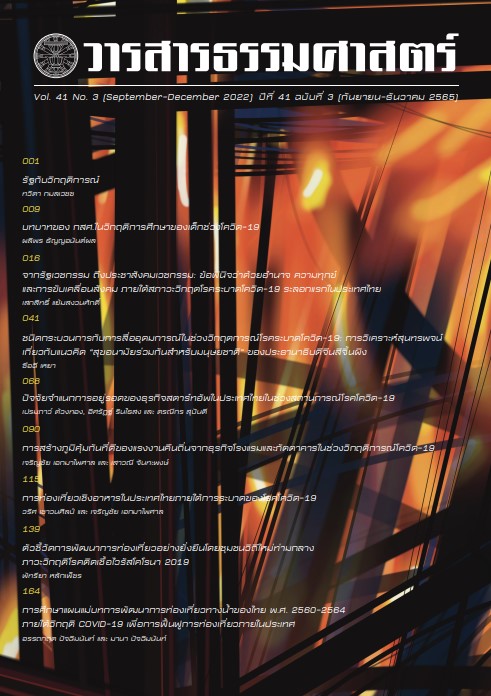From Medicalizing State to Medicalizing Civil Society: Consideration Power, Suffering, and Social Mobilization during COVID-19 Crisis First Wave Conditions in Thailand
Main Article Content
Abstract
This article investigates the state of Thai society during the first wave of the Novel Coronavirus 2019 (COVID-19) crisis with respect to power, social suffering, and social mobilization. The discussion will endeavor to grasp why the Thai government, which demonstrates administrative and managerial incompetence, leads to suffering and increased suicide rates, while maintaining relatively low death and infection rates during the first wave of the COVID-19 pandemic. The article suggests that under the present day’s Thai medicalizing state, which, in an administrative aspect, does not prioritize people as the highest objective, including how biopower has been promoted to legitimate absolute power. Although the latter leads to a decisive force in handling the crisis, it also leads to increased social melancholy as an aftermath effect. It finds that the strong extant medical structure together with public health reform as well as the rise of medical civil society are the key factors in mitigating the pandemic crisis. The medical civil society, in particular, plays a major role not only in data stabilizing but also in remedying the effects that occurred in the neglected and marginalized groups and filling the void of the government administration in rectifying the pandemic crisis in Thailand.
Article Details
References
กรกนก จิรสถิตพรพงศ์. (2564). ทัศนคติของประชาชนที่มีต่อหลักการบริหารกิจการบ้านเมือง และสังคมที่ดีของรัฐบาล กรณีศึกษาสถานการณ์ COVID-19. วารสารธรรมศาสตร์. 40(3), 93-113.
กรรณิการ์ ธรรมพานิชวงค์, กัมพล ปั้นตะกั่ว, กิรติพงศ์ แนวมาลี, ณิชา พิทยาพงศกร, เดือนเด่น นิคมบริรักษ์, ธิปไตร แสละวงศ์, นิพนธ์ พัวพงศกร, ยงยุทธ แฉล้มวงษ์, วิโรจน์ ณ ระนอง, สมเกียรติ ตั้งกิจวานิชย์, สมชัย จิตสุชน, สุเมธ องกิตติกุล, เสาวรัจ รัตนคำฟู และอดิศร์ อิศรางกูร ณ อยุธยา. (2562). ประเมินผลงาน 5 ปี รัฐบาลประยุทธ์ (1): ติดตามความคืบหน้าแก้ปัญหาประเทศ. สืบค้น 11 กรกฎาคม 2563, จาก https://tdri.or.th/2019/ 07/report-5years-prayut-cabinet/
ดนัย อังควัฒนวิทย์. (2563). บทบาทโรงพยาบาลรามาธิบดี ในสถานการณ์ COVID-19. @Rama, 9(2), 6-7.
ทวีศักดิ์ เผือกสม. (2561). เชื้อโรค ร่างกาย และรัฐเวชกรรม ประวัติศาสตร์การแพทย์สมัยใหม่ในสังคมไทย. กรุงเทพฯ : Illuminations Editions.
ประจักษ์ ก้องกีรติ และ วีระยุทธ กาญจน์ชูฉัตร. (2561). ระบอบประยุทธ์ : การสร้างรัฐทหารและทุนนิยมแบบช่วงชั้น. ฟ้าเดียวกัน, 16(2), 6-41.
พันชนะ วัฒนเสถียร. (2563). “Food For Fighters” สังเวียนโควิด-19 สร้างนักสู้: จากโครงการ “ข้าวเพื่อหมอ Food For Fighters”. วารสารธรรมศาสตร์, 39(2), 1-10.
วราภรณ์ ศรีบุญ, ปิยพร แตงสุวรรณ, พรรชชา ภิรมย์ลา, วราภรณ์ พรมบาล, สมหฤทัย อุดมโชค ชัย และอมรรัตน์ ไชยชาญยุทธ์. (2560). การมีส่วนร่วมของเครือข่ายประชาชนในการ จัดการภัยพิบัติ ตำบลกรุงชิง อำเภอนบพิตำ จังหวัดนครศรีธรรมราช. วารสาร มหาวิทยาลัยราชภีฏยะลา, 12(1), 45-60.
ศรุตา เขียวผิว และ ธนัชญา จั่นเล็ก. (2564). การฆ่าตัวตายในภาวะทุนนิยมของสังคมไทยปัจจุบัน. วารสารธรรมศาสตร์, 40(3), 140-160.
สุรชาติ บำรุงสุข. (2561). เมื่อข้าราชการเป็นนักยุทธศาสตร์ เมื่อยุทธศาสตร์เป็นของรัฐราชการ. มติชนสุดสัปดาห์.
อรรถจักร์ สัตยานุรักษ์ล บุญเลิศ วิเศษปรีชา, ประภาส ปิ่นตบแต่ง, สมชาย ปรีชาศิลปกุล, ณฐพงศ์ จิตรนิรัตน์, ธนิต โตอดิเทพย์ และธนพฤกษ์ ชามะรัตน์. (เมษายน 2563). สรุปผลการสำรวจ “คนจนเมืองในภาวะวิกฤติโควิด-19”และข้อเสนอแนะต่อรัฐบาล. สืบค้น 10 มิถุนายน 2563, จาก https://www.isranews.org/article/thaireform/thaireform-documentary/download/18017/87576/18.html
Chachavalpongpun, P. (2020). Coup, King, Crisis: A Critical Interregnum in Thailand. Yale University Southeast Asia Studies.
Reeves, A, McKee M, & Stuckler D. (2014). Economic suicides in the Great Recession in Europe and North America. The British journal of psychiatry: the journal of mental science, 205(3), 246-247.
Das, V. (1999). Critical Events: An Anthropological Perspective on Contemporary India. New York: Oxford University.
Farmer, P. (1997). On Suffering and Structural Violence: A View from Below. Social Suffering, London: University of California Press.
Foucault, M. (1980). Power/Knowledge: Selected Interviews and Other Writings 1972-1977. New York: Pantheon Books.
Foucault, M. (1991). Discipline and Punish: The Birth of the Prison. Tran slated by Alan Sheridan, London: Penguin Books.
Ganjanakhundee, S. (2020). Social Media and Thailand’s Struggle over Public Space. © ISEAS Yusof Ishak Institute. http://hdl.handle.net/11540/12159
Goffman, E. (1963). Stigma: Notes on the Management of Spoiled Identity. Englewood Cliffs NJ: Prentice Hall.
Gunnell, D., Appleby, L., Arensman, E., Hawton, K., John, A., Kapur, N., Khan, M., O'Connor C R., Pirkis, J. (2020 April). Suicide risk and prevention during the COVID-19 pandemic. Retrieved August 10, 2020, from https://www.thelancet.com/journals/lanpsy/article/PIIS2215-0366(20)30171-1/fulltext
International Crisis Group. (2020). Political Implications. In COVID-19 and a Possible Political Reckoning in Thailand. International Crisis Group. Retrieved from http://www.jstor.org/stable/resrep31376.8
kleinman, a., Das, V., & Lock, M (Eds.). (1997). Introduction. Social Suffering. London: University of California Press.
Laochankham, S., Kamnuansilpa,P., & Lowatcharin, G. (2021). Locally Driven Action in Pandemic Control: The Case of Khon Kaen Province, Thailand. Contemporary Southeast Asia, 43(1), 8–14.
Miller, D., Elisabetta, C., Nell, H., Tom, M., Razvan, N., Jolynna, S., Juliano, S., Shriram, V., & Xinyuan, W. (2016). How the World Changed Social Media. London: UCL Press.
Szasz, T. (2001). The Therapeutic State: The Tyranny of Pharmacracy. Retrieved August 12, 2020, from https://www.independent.org/pdf/tir/tir_05_4_ szasz.pdf.
Taub, A. (2020 April). A New Covid-19 Crisis: Domestic Abuse Rises Worldwide. Retrieved August 10, 2020, from https://www.nytimes.com/2020/04/06/ world/coronavirus-domestic-violence.html
WHO. (2020). Ensuring sufficient physical infrastructure and workforce capacity. In COVID-19Health System Response Monitor: THAILAND. World Health Organization. Retrieved from http://www.jstor.org/stable/resrep27943.7
WHO. (2020). THAILAND: How a Strong Health System Fights a Pandemic. World Health Organization. Retrieved from http://www.jstor.org/stable/resrep28100

